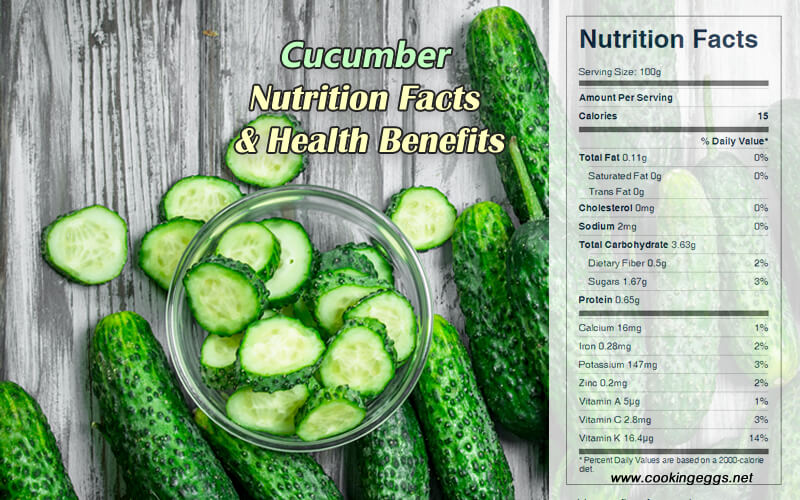Cucumber Nutrition Facts & Health Benefits
They are an excellent hot weather snack because they provide both water and electrolytes to help with hydration and blood pressure. They have many health-promoting properties, including antioxidant and anti-inflammatory effects. Here are the nutritional benefits of cucumber.

The nutritional composition of cucumber
Raw cucumber is 95% water, 4% carbohydrates, 1% protein, and contains negligible fat. It has a low content of micronutrients: it is notable only for vitamin K, at 14% of the Daily Value.
One cup of raw cucumber slices, with the peel, provides 16 calories, 3.8 g carbohydrate, 0.7 g protein, 0.1 g fat, 0.5 g dietary fiber, 109 IU vitamin A, 3 mg vitamin C, 7 mcg folic acid, 153 mg potassium, 25 mg phosphorus, 17 mg calcium, and 14 mg magnesium.
Raw CucumberNutrition Facts Label
Health Benefits of Cucumber
Cucumbers are more than 95% water and nearly 4% carbohydrate, making them excellent for hydration.Eating them can truly help relieve summer heat. They provide vitamins A, C, and K, folate, and other B vitamins. In addition, they contain phosphorus, potassium, vitamin E, beta-carotene, and folic acid, and the peel is rich in silicon and chlorophyll.
Cucumbers possess two key phytonutrients: cucurbitacins and lignans. Cucurbitacin has been studied by pharmaceutical companies as a potential avenue for the next cancer drug. This phytonutrient can block the signaling pathways that allow cancer cells to survive and multiply. A 2009 study looked at cucurbitacin B extract on human pancreatic cells and found it inhibited growth by 50 percent. It has also shown the potential to inhibit the growth of cancer cells in laboratory studies.
Lignans also have anticancer properties, protecting against cancer by working with the bacteria in the digestive tract. One study of nearly 800 American women found those with the highest lignan intake had the lowest ovarian cancer risk.
Cucumbers also contain several antioxidants, such as vitamin C, beta-carotene, and manganese. Fresh cucumber extracts demonstrated increased scavenging free radical ability in animal studies. The triterpenes present in cucumbers also have a positive anti-inflammatory effect on the immune system. The complex mechanism here can be described by the ability of cucurbitacin to inhibit various mechanisms and functions related to inflammation.
Have you ever wondered why it’s recommended to put cucumbers on the eyes for anti-aging benefits? Cucumber slices placed on puffy, tired eyes reduce redness and inflammation. The compound that makes cucumber slices a kitchen remedy for puffy eyes is believed to be caffeic acid. It is found in many plants but is especially accessible in cucumbers and has been shown to be an antioxidant.
The antioxidant scavenging ability of cucumbers decreases free radicals when ingested as well as on your skin. Enjoy eating them while also utilizing them in skincare. As a facial, it clears up acne and encourages wrinkle-free skin.
Cucumbers can also help heal from the outside. Mashed cucumber applied topically cools burns, wasp stings, and tired, swollen feet.
In addition, the cucumber peel's high silicon content is believed to encourage healthy growth of skin, nails, and hair.